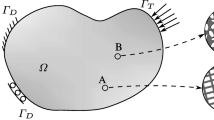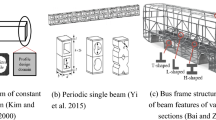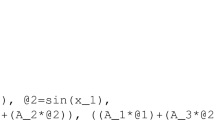Abstract
A scalable problem to benchmark robust multidisciplinary design optimization (RMDO) algorithms is proposed. This allows the user to choose the number of disciplines, the dimensions of the coupling and design variables and the extent of the feasible domain. After a description of the mathematical background, a deterministic version of the scalable problem is defined and the conditions on the existence and uniqueness of the solution are given. Then, this deterministic scalable problem is made uncertain by adding random variables to the coupling equations. Under classical assumptions, the existence and uniqueness of the solution of this RMDO problem is guaranteed. This solution can be easily computed with a quadratic programming algorithm and serves as a reference to assess the performance of RMDO algorithms. This scalable problem has been implemented in the open-source library GEMSEO and tested with two techniques of statistics estimation: Monte-Carlo sampling and Taylor polynomials.

Similar content being viewed by others
Notes
\(\forall \textbf{x}\in \mathbb {R}^{{d}}{\setminus }\{0_{{d}}\}, \textbf{x}^\top \textbf{Q}\textbf{x}= \textbf{x}^\top \textbf{Q}_{\textbf{x}_0}\textbf{x}+ \textbf{x}^\top \varvec{\beta }^\top \varvec{\beta }\textbf{x}= \Vert \textbf{x}_0\Vert ^2 + \Vert \varvec{\beta }\textbf{x}\Vert ^2 \ge 0\).
The norm of the residuals divided by the norm of the initial residuals shall be lower than the relative tolerance.
References
Allendoerfer CB (1974) Theorems about differentiable functions. Calculus of several variables and differentiable manifolds. Macmillan, New York
Andersen M, Dahl J, Liu Z, Vandenberghe L (2011) Interior-point methods for large-scale cone programming. Optimization for machine learning, chap 3. The MIT Press, pp 55–79
Arras KO (1998) An introduction to error propagation: derivation, meaning and examples of equation CY= FX CX FXT. Technical report, ETH Zurich
Balesdent M, Bérend N, Dépincé P, Chriette A (2012) A survey of multidisciplinary design optimization methods in launch vehicle design. Struct Multidiscipl Optim 45:619–642
Balling RJ, Sobieszczanski-Sobieski J (1996) Optimization of coupled systems–a critical overview of approaches. AIAA J 34(1):6–17. https://doi.org/10.2514/3.13015
Brevault L, Balesdent M, Morio J (2020) Aerospace system analysis and optimization in uncertainty. Springer. ISBN 978-3-030-39125-6. https://doi.org/10.1007/978-3-030-39126-3
Coelho RF, Breitkopf P, Knopf-Lenoir C, Villon P (2010) Bi-level model reduction for coupled problems. Struct Multidiscipl Optim 39(4):401–418. https://doi.org/10.1007/s00158-008-0335-3
Cramer EJ, Dennis JE Jr, Frank PD, Lewis RM, Shubin GR (1997) Problem formulation for multidisciplinary optimization. SIAM J Optim 4(4):754–776. https://doi.org/10.1137/0804044
Delbos F, Gilbert JC (2005) Global linear convergence of an augmented Lagrangian algorithm to solve convex quadratic optimization problems. J Convex Anal 12:45–69
Gallard F, Vanaret C, Guénot D, Gachelin V, Lafage R (2018) GEMS: a Python library for automation of multidisciplinary design optimization process generation. In: 2018 AIAA/ASCE/AHS/ASC structures, structural dynamics, and materials conference
Agarwal H, Renaud JE, Preston EL, Padmanabhan D (2004) Uncertainty quantification using evidence theory in multidisciplinary design optimization. Reliab Eng Syst Saf 85:281–294. https://doi.org/10.1016/j.ress.2004.03.017
Giassi A, Bennis F, Maisonneuve JJ (2004) Multidisciplinary design optimisation and robust design approaches applied to concurrent design. Struct Multidiscipl Optim 28:356–371. https://doi.org/10.1007/s00158-004-0417-9
Haldar A, Mahadevan S (2000) Probability, reliability, and statistical methods in engineering design. Wiley
Koch PN, Wujek B, Golovidov O, Simpson TW (2002) Facilitating probabilistic multidisciplinary design optimization using kriging approximation models. In: 9th AIAA/ISSMO symposium on multidisciplinary analysis and optimization. https://doi.org/10.2514/6.2002-5415
Kozlov MK, Tarasov SP, Khachiyan LG (1980) The polynomial solvability of convex quadratic programming. USSR Comput Math Math Phys 20(5):223–228. ISSN 0041-5553. https://doi.org/10.1016/0041-5553(80)90098-1
Kroese D, Rubinstein R (2012) Monte Carlo methods. Wiley Interdiscipl Rev: Comput Stat 4:48–58. https://doi.org/10.1002/wics.194
Liu Z, Song Z, Zhu P, Xu C (2020) Uncertainty-based multidisciplinary design optimization for feedback-coupled systems under both parametric and metamodeling uncertainties. In: International design engineering technical conferences and computers and information in engineering conference, vol 84010. American Society of Mechanical Engineers, p V11BT11A041. https://doi.org/10.1115/DETC2020-22161
Madsen HO, Krenk S, Lind NC (2006) Methods of structural safety. Courier Corporation
Martins JR, Lambe AB (2013) Multidisciplinary design optimization: a survey of architectures. AIAA J 51:2049–2075. https://doi.org/10.2514/1.J051895
Martins J, Ning A (2022) Engineering design optimization. Cambridge University Press. ISBN 9781108833417
Oakley DR, Sues RH, Rhodes GS (1998) Performance optimization of multidisciplinary mechanical systems subject to uncertainties. Probab Eng Mech 13(1):15–26. https://doi.org/10.1016/S0266-8920(97)00004-0. ISSN 0266-8920
Ortega JM (1973) Stability of difference equations and convergence of iterative processes. SIAM 10(2):268–282
Powell MJ (2007) A view of algorithms for optimization without derivatives. Math Today-Bull Inst Math Appl 43(5):170–174
Sellar R, Batill SM, Renaud J (1996) Response surface based, concurrent subspace optimization for multidisciplinary system design. In: 34th aerospace sciences meeting and exhibit. https://doi.org/10.2514/6.1996-714
Silverman BW (1988) Density estimation for statistics and data analysis. Biometr J 30(7):876–877. https://doi.org/10.1002/bimj.4710300745
Sobieszczanski-Sobieski J (1990) Sensitivity of complex, internally coupled systems. AIAA J 28:02
Sobieszczanski-Sobieski J, Agte J, Sandusky, Jr R (1998) Bi-level integrated system synthesis (BLISS). In: 7th AIAA/USAF/NASA/ISSMO symposium on multidisciplinary analysis and optimization. https://doi.org/10.2514/6.1998-4916
Sobol IM (2018) A primer for the Monte Carlo method. CRC Press
Tedford N, Martins J (2010) Benchmarking multidisciplinary design optimization algorithms. Optim Eng 11:159–183. https://doi.org/10.1007/s11081-009-9082-6
Tedford N, Martins J (2006) On the common structure of MDO problems: a comparison of architectures. In: 11th AIAA/ISSMO multidisciplinary analysis and optimization conference, p 7080. https://doi.org/10.2514/6.2006-7080
Vanaret C, Gallard F, Martins JR (2017) On the consequences of the “no free lunch” theorem for optimization on the choice of an appropriate MDO architecture. In: 18th AIAA/ISSMO multidisciplinary analysis and optimization conference, p 3148. https://doi.org/10.2514/6.2017-3148
Wright M (2004) The interior-point revolution in optimization: history, recent developments, and lasting consequences. Bull Am Math Soc 42:39–57. https://doi.org/10.1090/S0273-0979-04-01040-7
Yao W, Chen X, Luo W, Van Tooren M, Guo J (2011) Review of uncertainty-based multidisciplinary design optimization methods for aerospace vehicles. Progr Aerosp Sci 47(6):450–479. https://doi.org/10.1016/j.paerosci.2011.05.001
Yi SI, Shin J, Park G (2008) Comparison of MDO methods with mathematical examples. Struct Multidiscipl Optim 35:391–402. https://doi.org/10.1007/s00158-007-0150-2
Acknowledgements
We wish to acknowledge the PIA framework (CGI, ANR) and the industrial members of the IRT Saint Exupéry project R-Evol: Airbus, Liebherr, Altran Technologies, Capgemini DEMS France, CENAERO and CERFACS for their support, financial funding and own knowledge. We are grateful to Réda Chhaïbi (Institut de Mathématiques de Toulouse) for useful discussions on random matrices. We acknowledge Syver Døving Agdestein for a preliminary work on this topic, during his master internship.
Funding
The authors have not disclosed any funding.
Author information
Authors and Affiliations
Corresponding author
Ethics declarations
Conflict of interest
On behalf of all authors, the corresponding author states that there is no conflict of interest.
Replication of results
All the details required for the replication of the results presented in this paper are provided in Sects. 3 and 4. The scalable problems (8) and (10) and the QP problems (9), (15) and (16) are available in the open-source library GEMSEO. The MDO problems (8) and (10) can be solved with the packages gemseo and gemseo-umdo respectively, with different MDO formulations and statistics estimators.
Additional information
Publisher's Note
Springer Nature remains neutral with regard to jurisdictional claims in published maps and institutional affiliations.
Rights and permissions
Springer Nature or its licensor (e.g. a society or other partner) holds exclusive rights to this article under a publishing agreement with the author(s) or other rightsholder(s); author self-archiving of the accepted manuscript version of this article is solely governed by the terms of such publishing agreement and applicable law.
About this article
Cite this article
Aziz-Alaoui, A., Roustant, O. & De Lozzo, M. A scalable problem to benchmark robust multidisciplinary design optimization techniques. Optim Eng 25, 941–958 (2024). https://doi.org/10.1007/s11081-023-09830-y
Received:
Revised:
Accepted:
Published:
Issue Date:
DOI: https://doi.org/10.1007/s11081-023-09830-y




